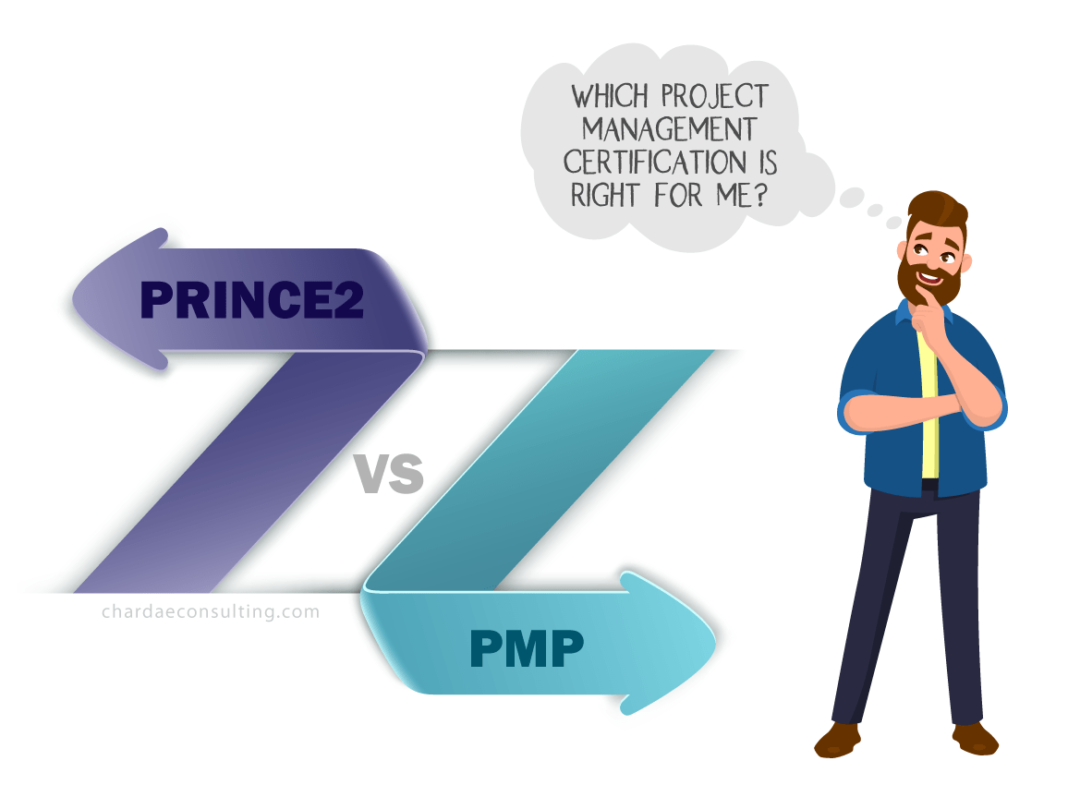For those wishing to obtain a certification in Project Management, the choice is not easy. There are currently three major international professional certifications based on Project Management methodologies: Prince2®, AgilePM®, and PMP®. These certifications are each available on several levels.
Prince2®
The PRINCE methodology was initially based on a Project Management method called PROMPT which was adopted by a government body, the CCTA (Central Computer and Telecommunications Agency), in 1979 as a reference methodology before being abandoned in favor of PRINCE. The name PRINCE corresponds to an acronym for PRojects IN Controlled Environments. Following its adoption by the CCTA in 1989, the PRINCE methodology quickly gained popularity across other UK government agencies. In 1996, an overhaul and update of this methodology (in collaboration with more than 150 European entities) resulted in PRINCE2®. Since 2010, Prince2® has been managed by the OGC (Office of Government Commerce), another British government entity.
This history helps to understand better the preponderance of this certification and the associated methodology within government bodies, public entities, and prominent British companies. Quickly, Prince2® became popular in many European countries. Today, the distribution of Prince2® is international, with translations in 19 languages.
Accessible and requiring no prerequisites, it has two levels:
• Prince2® Foundation is the first-level certification obtained by an MCQ following a 3-day training. The pass rate for the exam globally is close to 94%.
• Prince2® Practitioner, the second level certification, is also obtained by an MCQ after additional 2-day training. Prerequisites: having obtained the Prince2® Foundation certification. The pass rate for the exam worldwide is around 70%.
Today, nearly 1,500,000 people are Prince2 Foundation certified in more than 150 countries worldwide.
PMP® from PMI
The PMI (Project Management Institute) has initially been the North American project management association. It was created by project managers wishing to provide their peers with the means to associate effectively, share information and identify “Best Practices.” The first official meeting of the PMI took place at the prestigious Georgia Institute of Technology in 1969 before quickly becoming a global association, present in almost every country in the world. The PMI is at the origin of many standards in project management, including the famous PMBOK® (Project Management Body of Knowledge), the “bible” of project management, printed in more than 6 million copies and translated into many languages. The PMBOK®, whose sixth edition was published in 2017,
There are 5 PMI certifications, and we will only mention the three main ones here:
• CAPM®, entry-level, does not require any prerequisites. Three-hour MCQ exam.
• PMP®, confirmed project manager level. MCQ exam with 200 questions to be completed in four hours.
• PgMP®, for program managers. Instead, a complex examination, including, in particular, an evaluation of the candidate by his peers, according to the 360° method.
Among these 3 certifications, the PMP® (Project Management Professional) is undoubtedly the best known and recognized. A valid international certification of reference, the PMP® makes it possible to enhance a level of experience and expertise in people management skills. This certification is intended for people with minimum experience in project manager positions or functional/operational manager positions related to projects. To be able to pass this certification, it will be necessary to justify:
– a Bac+4 level with 4500 hours of experience as a project manager over the last 6 years as well as 35 hours of training in project management (approved by the duration of specific training courses),
– or a level Bac (or equivalent) with 7500 hours of project management over the last 8 years for a lower level and 35 hours of training in project management (approved by the duration of specific training courses).
Today, nearly 850,000 people are PMP® certified worldwide. . You should note that the PMI France Chapter is the first chapter in terms of several members outside of North America.
AgilePM
Project management techniques have changed significantly in recent years. Until recently, companies mainly used traditional methods, sequential approaches, called “cascades,” to manage their projects.
Far too many projects were failing, mainly because the projects were too big or too long or because communications and customer engagement weren’t effective enough. . measured progress in the completion percentage rather than the value delivered to the organization.
The AgilePM® model offers practical and repeatable support that achieves an ideal balance between the standards, rigor, and visibility required for the good of project management on the one hand; and the rapid pace, changes, and evolution of the other’s organization.
Great detail is brought to the organization of the project, and the strong delegation generates Agility.
Emphasis is placed on progressively building solutions with the client to enable project teams to respond quickly and effectively to changes.
The project team is a real customer/supplier integration collaboratively and iteratively developing the requested solution.
This certification is very complementary to the Prince2® and PMP® certifications. Indeed, its focus on Agility perfectly complements the Prince2® certification (or even PMP®, which still has a part on Agility).
Today, more than 100,000 people are AgilePM® certified worldwide.
How to choose from this jungle of certifications?
Must consider three criteria:
• the type of company in which you work and its international dimension or not, determining the type of certification,
• your experience as a project manager, determining the level of certification,
• your availability and the personal investment you can devote to learning and preparing for exams.
How to choose the type of certification in project management?
If your company is a global company, it will have chosen, like 90% of them, either the PMP certification or the PRINCE2® certification.
The PMP certification is often encountered in the industrial world, where PRINCE2® and AgilePM® are often found in services, IT, and any sector where the needs and the environment are likely to be changing. Even scalable. But these are only significant trends because each approach can support all types of projects.
Suppose you are in a company with headquarters in the United Kingdom or a Commonwealth country. In that case, the choice may likely be made instead of Prince2® certifications.
How to choose certification about your experience in project management?
– If you have little experience as a project manager or a budding interest in project management, the Prince2® Foundation, and Agile PM® Foundation certifications seem the most suitable.
– If you have already led a few projects, aim for Prince2® Practitioner or AgilePM® Practitioner certification.
– If you have a solid experience of several years as a project manager, aim for PMP ® certification instead.
Finally, suppose you have managed a set of projects as a program or managed your company’s portfolio of projects. In that case, you can aim for PgMP® certification.

















